Armenia has had a tough go at it. The country is lilliputian, landlocked and lacking in most worthwhile natural resources. The most famous living members of the Armenian race are Kim Kardashian and Cher who, like the vast majority of Armenians, live outside of Armenia. The Turks tried to erase them from the pages of history 99 years ago and the Azeris would do it now if they knew they could get away with it, which means Armenia’s only true friend is Vladimir Putin. Vladimir Putin! I feel for Armenia – I really do.
And I really like Armenian people. Every Armenian I’ve ever met has been excessively kind, to say nothing of the passion they exude for their country. In fact, I decided I wanted to visit Armenia within a few minutes of meeting my very first Armenian, a woman named Agnes, at a wine tasting in Portugal in 2011. She was convincing – and I was convinced.
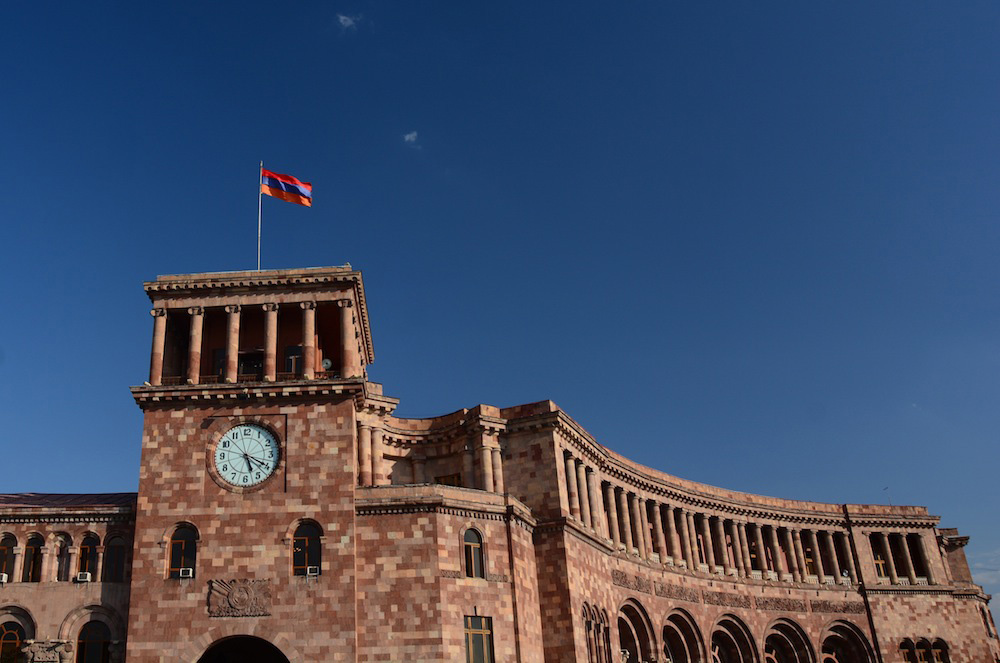
The Armenians I met on the marshrutka from Tbilisi to Yerevan galvanized this conviction. One, an elderly woman who didn’t speak any English, used her facial expressions and gestures to invite me down to the river near where our minibus made a pit stop, and shared tomatoes, cucumbers and fresh-baked bread with me. As we enjoyed our lunch under the shade of an overgrown grapevine, a younger Armenian woman joined us, and used her English skills to help me ask my new friend a little about herself. When we finally arrived to Yerevan, she (the younger one, this is) helped me get a taxi to my hotel.
Or at least, she tried.
“Train station?” he asked, after I showed him a map of my hotel’s location, along with its name and address translated into Armenian script.
I put the map close to his face and pointed to the exact location of my destinations – nothing. Likewise, even when my new Armenian friend dictated exactly where I needed to go, in Armenian, he draw a blank.
Looking back, I suppose he might’ve been illiterate, but it didn’t matter: He wouldn’t have been able to do anything for me but take my money and drive me someplace I didn’t want or need to go.
I tried to look on the bright side. I’d been sitting for over six hours, after all, so a walk wouldn’t kill me. Plus, it would allow me to familiarize myself with the layout of the city before I even officially began exploring later that evening, which was great since I had a packed schedule without a lot of time dedicated simply to enjoying Yerevan. I felt optimistic as I headed in the general direction of the city center.
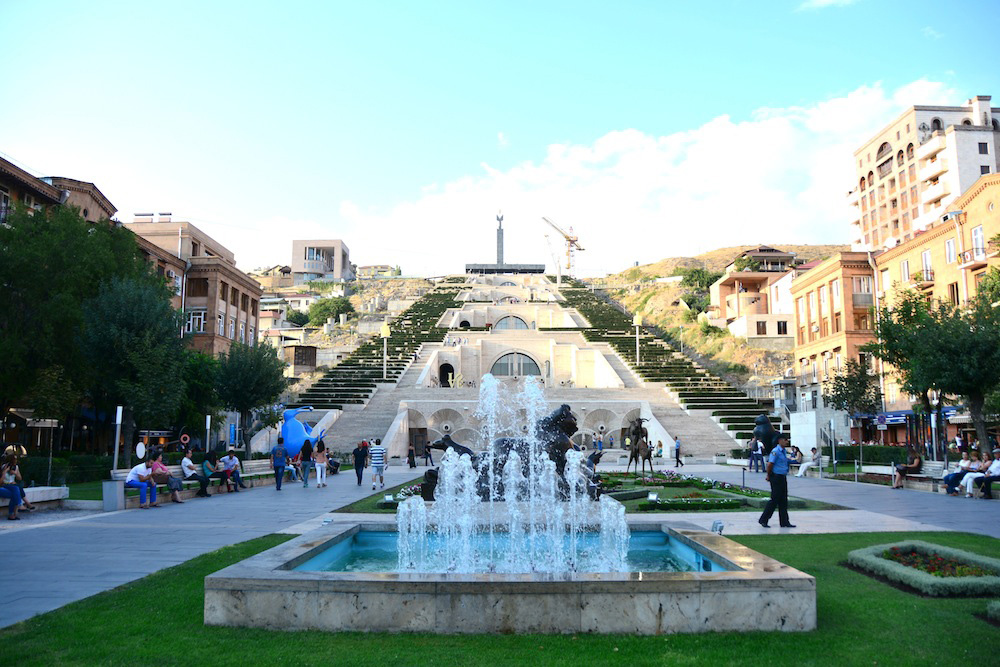
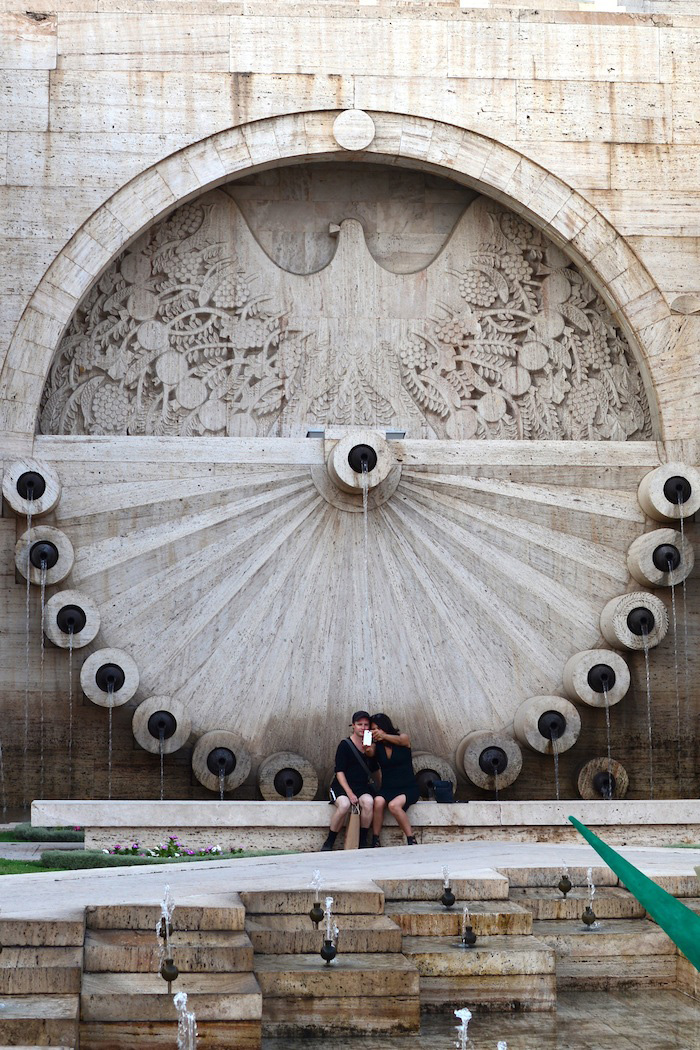
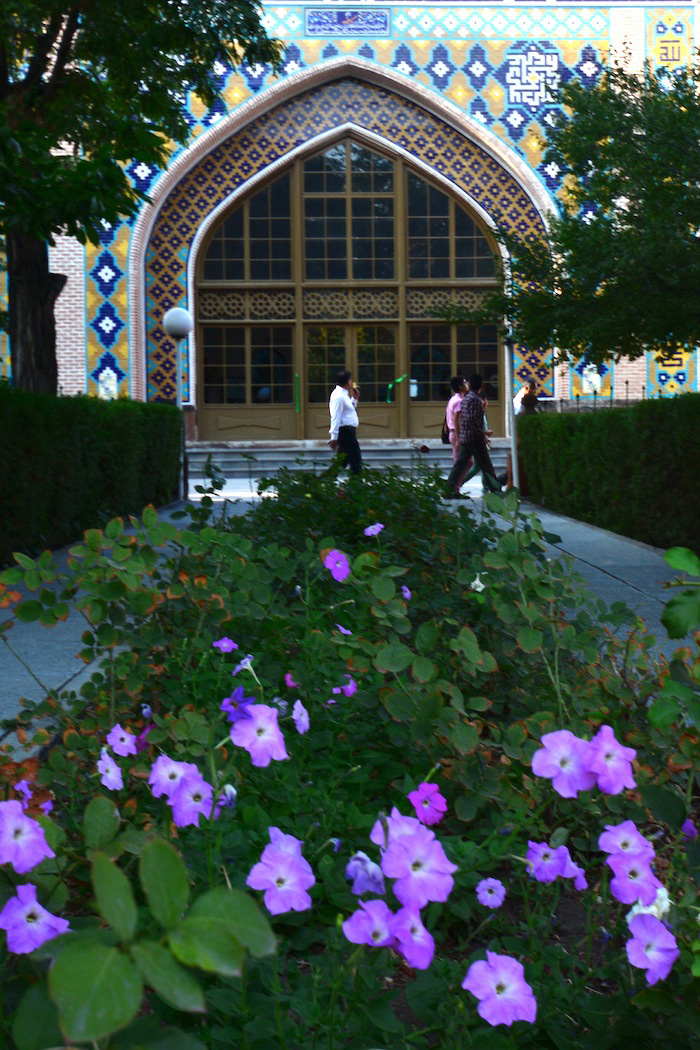
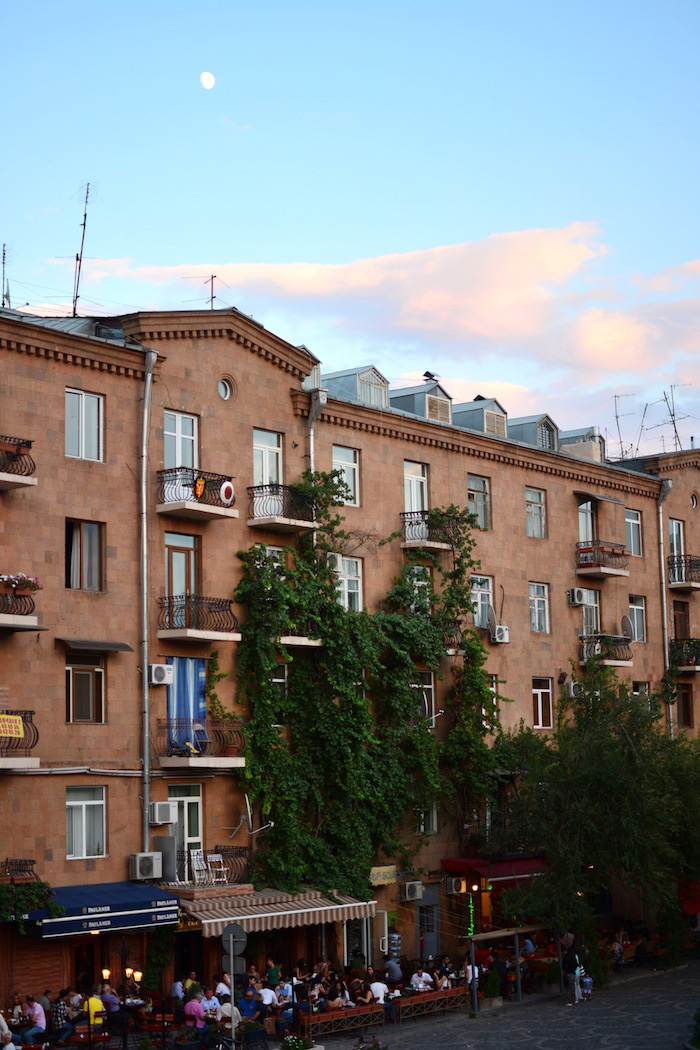
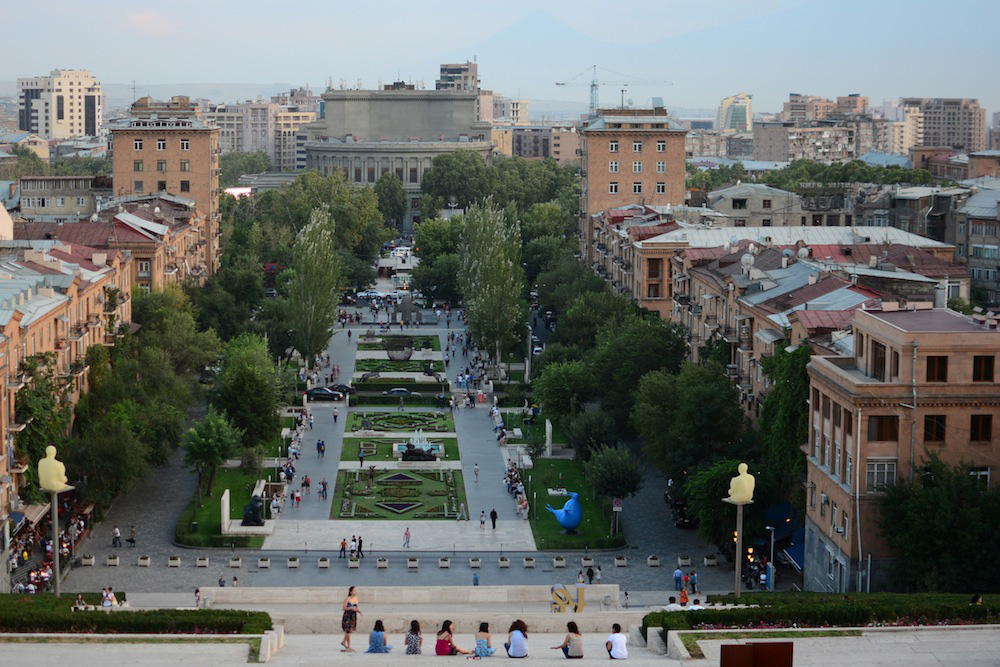
“Yerevan is like Tbilisi, but much smaller,” my friend and fellow blogger Becki had advised me last week as we were having coffee along Rustaveli Avenue in the Georgian capital, a few hours in advance of my short trip to Azerbaijan. “And with basically nothing to do – you can see it all in half a day.”
I tried to keep these words in mind as I headed out into Yerevan with my camera a couple hours before sunset. Knowing the extent to which genocide and the Communist period had robbed Yerevan of much of its soul, I decided my first stops would be the Blue Mosque and the Opera House, two of the only surviving historical buildings in Yerevan. Neither were even one percent as charming their similarly-named counterparts in other European cities, to say nothing of how bland everything that sat between them was.
Even the so-called Cascade, a massive concrete staircase that connects the center of Yerevan with a monument built to commemorate 50 years of Soviet rule, failed to evoke any sort of reaction from me – intellectual, emotional or creative. Mount Ararat, the city’s landmark, was almost invisible through the layer of the haze that had built up by the time I reached the Mother of Armenia, home to a statue of an angry-looking woman and one of Yerevan’s highest viewpoints. I felt less than inspired, but I once again put on my rose-colored glasses.
The rest of Armenia, I reassured myself as the last rays of sun disappeared behind the city, will seem even more amazing now.
Every road in Armenia is covered in bullshit, even the newly-paved highway between Yerevan and Lake Sevan, the massive body of freshwater that is Armenia’s consolation prize for lacking a proper seaside. Getting anywhere or doing anything in Armenia, whether you need a taxi from the central bus station to a well-known city center hotel, or a minibus to the country’s most ubiquitous landmark, is a fucking ordeal.
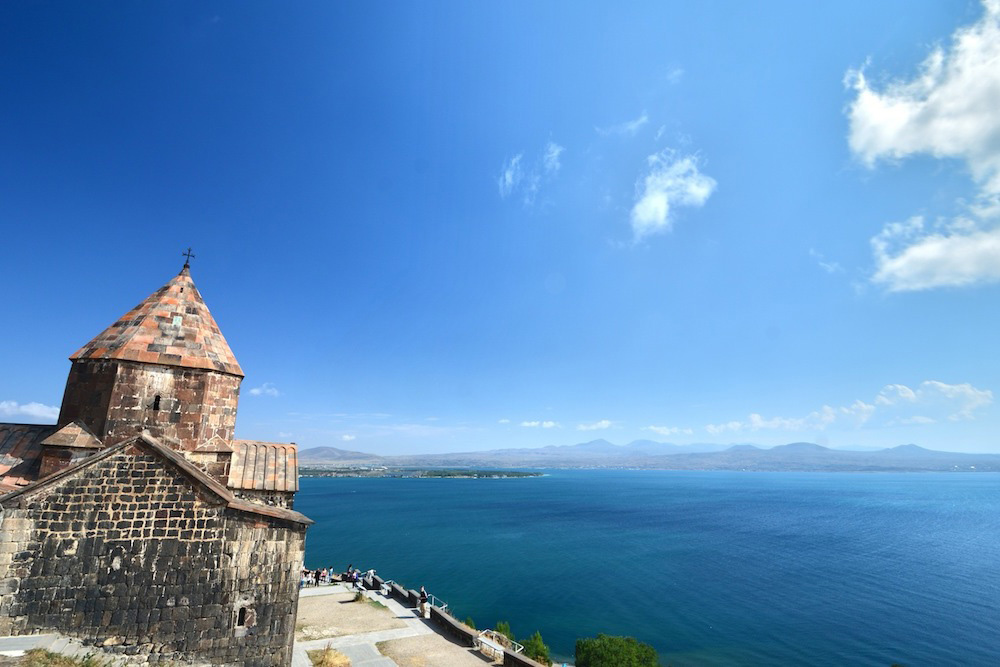
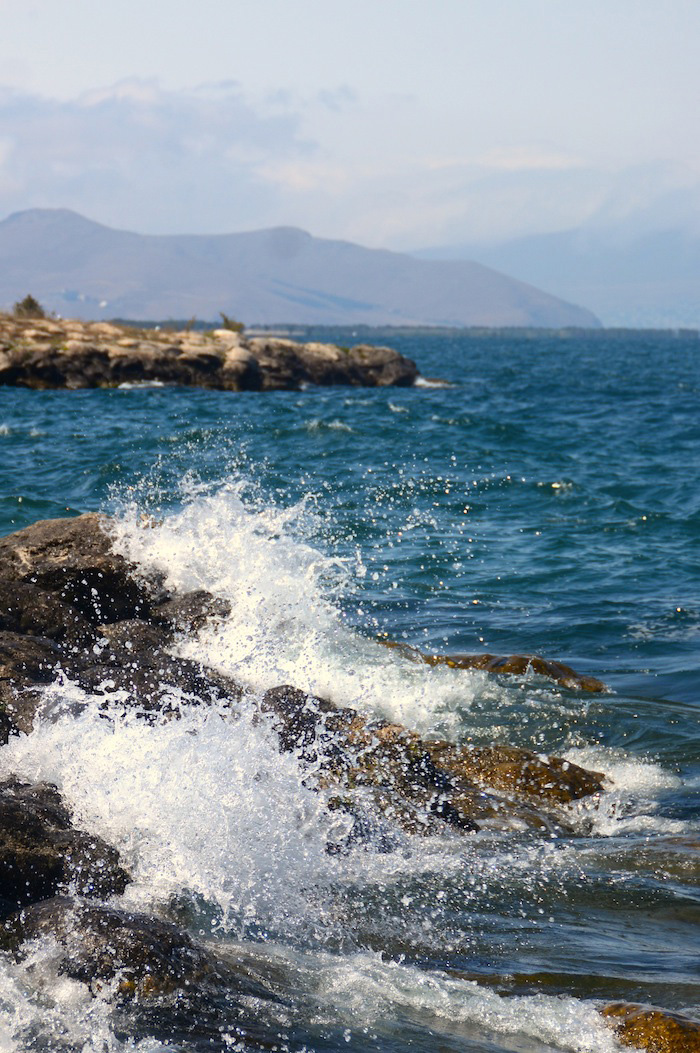
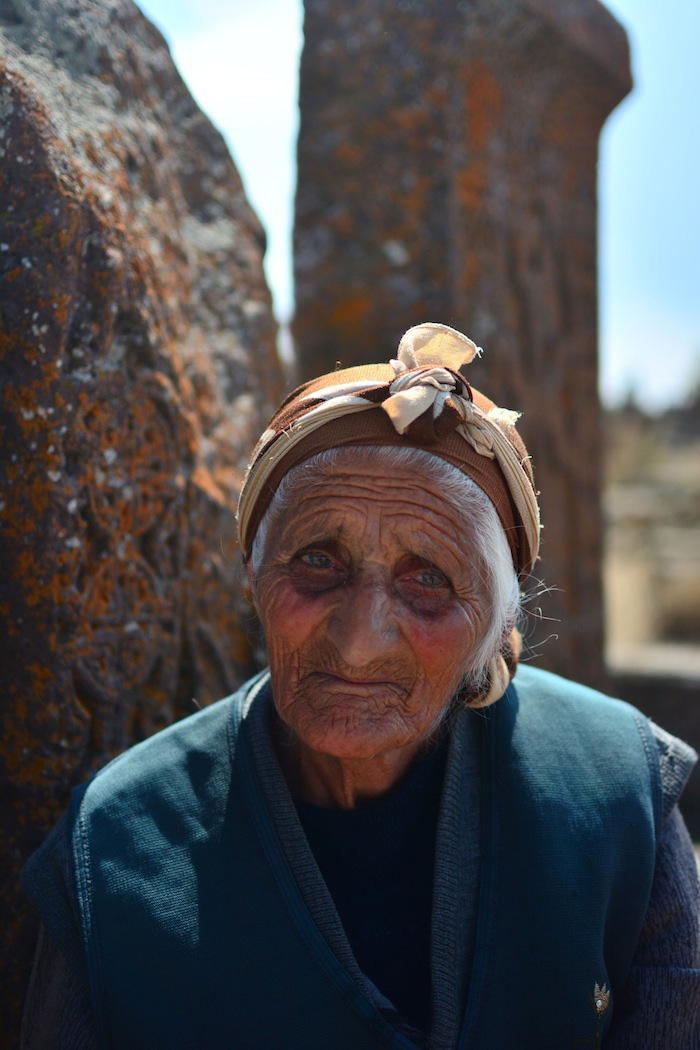
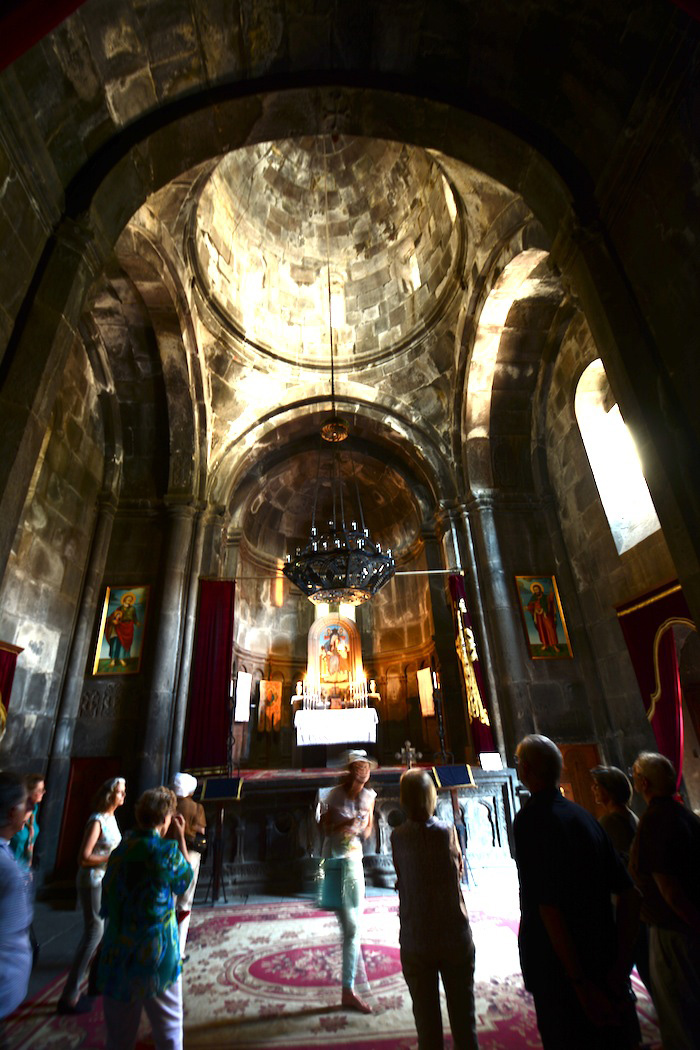
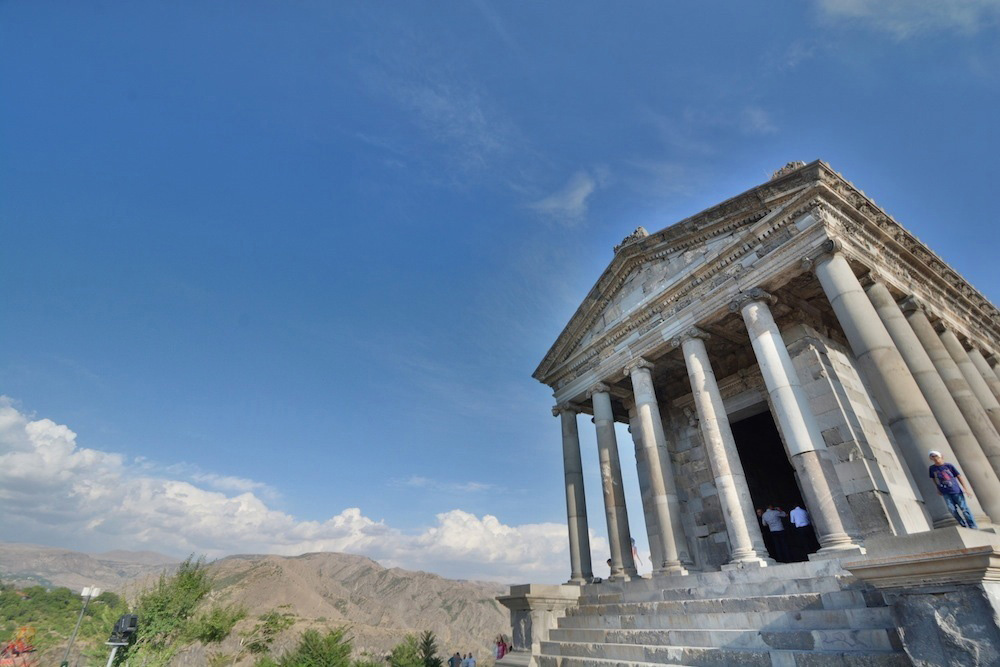
Unless you go on an organized tour, which was the only thing that allowed me to see Lake Sevan, the rock-hewn Geghard Monastery and first-century pagan temple of Garni within the span of a few hours during my second day in Armenia. I was on a high from these blissful, few hours when I woke up my third morning, with the intent of taking the aforementioned minibus to the aforementioned ubiquitous landmark, Tatev Monastery, located about 200 km southeast of Yerevan.
I knew getting to Tatev would be a long journey (on account of the bullshit-covered roads) and an indirect one (I would first need to go to the town of Goris, where I would check into a guest house, before continuing on to the monastery itself). But I also assumed that it would be doable, given that I woke up and set out early and that I arranged the aforementioned guest house and onward journey to the monastery before I set out.
And, you know, the fact that Tatev Monastery is Armenia’s most ubiquitous landmark.
The first pile of bullshit I stepped in was that of my own negligence. I failed to consider that Yerevan might have more than one bus station, and so I wasted an hour walking (I didn’t dare summon another braindead taxi driver) to and from the one where I’d arrived from Tbilisi. Sure enough, buses to Goris did not run from there.
That’s fine, I mustered a smile as I walked back up the steps of the majestic Tufenkian Historic Yerevan Hotel, whose marketing manager was nice enough to put me up during my time in Yerevan. Nothing wrong with asking for help.
And help the front desk staff did, or at least they tried. As I suspected, I had initially gone to the wrong bus station, and they assured me several buses going to Goris (or at least, in that general direction) would be waiting for me when I got to the “correct” one. So confident were they in what they told me – and so empathetic RE: my previous experiences with taxi drivers – that they encouraged me to enjoy a walk southward through the city en route to said bus station.
Buses to Goris did not run from this bus station, either.
If I’m honest I was furious, in no small part because the only English word any of the people around me seemed to know was “taxi,” which they blurted out in a guttural bellow not unlike the verbalizations of a Downs syndrome child. But in spite of that – and in spite of the fact that my feet were close to bleeding and my sanity/spirit close to breaking by this time – I still remained committed to solving my problem. I will go back to the hotel, I vowed, and if worse comes to worse, I will just head back to Tbilisi.
Of course, I really didn’t want to do that – visiting Tatev was probably my top reason for visiting Armenia in the first place, what with it being the country’s most ubiquitous landmark. And so, I re-entered the hotel prepared to do anything to achieve that goal, save for paying some tout tens of thousands of dram to take me there by taxi. Which, incidentally, was the first thing the well-meaning concierge suggested.
After a few more minutes of brainstorming, the front desk proposed I take a taxi (which they would arrange) back to the station, where my driver would assist me in finding exactly the point minibuses to Goris (which they still insisted existed) would leave from.
It’s almost over, I smiled and breathed deeply as I saw the car pull up outside the hotel. You’re almost there.
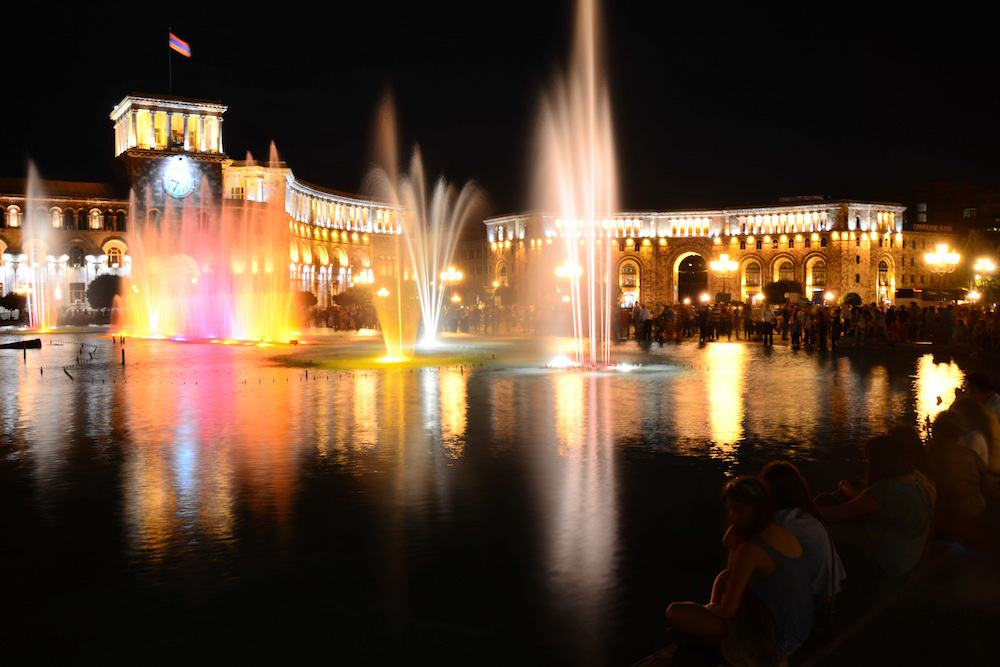
I knew it was a bad sign when the taxi driver barked something at me in Armenian as I sat down – he clearly knew nothing of any of my plans. The front desk staff immediately came out and explained it to him but even then, he brought me to the train station, not the bus station. And even when we arrived at the bus station (the “correct” one, of course), nothing had changed – there were still no buses to Goris. I was about to have the driver take me back to the hotel, where I imagined I would just curl up in a ball on the floor and cry, when a tall, balding fellow wearing a pink polo shirt and white man-capris approached me.
“Taxi to Goris,” he said with a smile, “4,000 dram.”
I did the conversion in my head. That’s only $10 – no way it’s legit.
“Ten dollars,” he read my mind. “Minibus already left at 7 a.m. and it was 3,500.”
He pointed me in the direction of a Mercedes station wagon, in whose backseat two older ladies were sitting with their hands clasped and half-smiled on their faces. A share taxi! I reveled in the seeming evidence that I wasn’t going to be baited-and-switched. This, I can do.
As the driver of the Mom-mobile (who was not the pink-clad man who had booked my proverbial trip for me) loaded my second bag into its trunk, I felt slightly worried that I was only the third of five potential passengers to Goris – if you’ve ever traveled in a developing country, you know shared private transport doesn’t leave until every seat is full, sometimes with more than one person.
But after all I had been through up to that point, I refused to fall into outright pessimism. It will be 15 minutes, maybe 30. After 30 I’ll leave – and that will be it! But we will be gone long before then.
Wouldn’t you know, the car was still there after 30 minutes. It was still there after 45, too – wanting to give the driver the benefit of the doubt, I allotted him a 15-minute grace period – so after an hour, Mr. Clam Diggers had re-adjusted my quote. “You want to go now? Three people,” he pointed at me and the two older ladies, “each 5,000, not 4,000. OK?”
I nodded, realizing the price for an immediate departure was a mere $2.50 in addition to what I’d already committed to paying. “We leave right now?”
He smiled. “Of course.”
We hadn’t left after 15 more minutes, so I grabbed my bag (I say “grabbed,” but I basically had to pry it out of the vehicle, which took at least 15 additional minutes) and walked back into central Yerevan, which took an additional 30 minutes. Not wanting to burden the hotel with additional trouble, I sat down at the first bar I saw and did the only thing a bougey backpacker can do in a situation like this: Drown my sorrows in a glass of local wine – and bitch about them on Facebook via free Wi-Fi, which I also used to ascertain that I had missed the last marshrutka back to Tbilisi.
I’m marooned, I sipped my Armenian dry white. I’m fucking marooned.
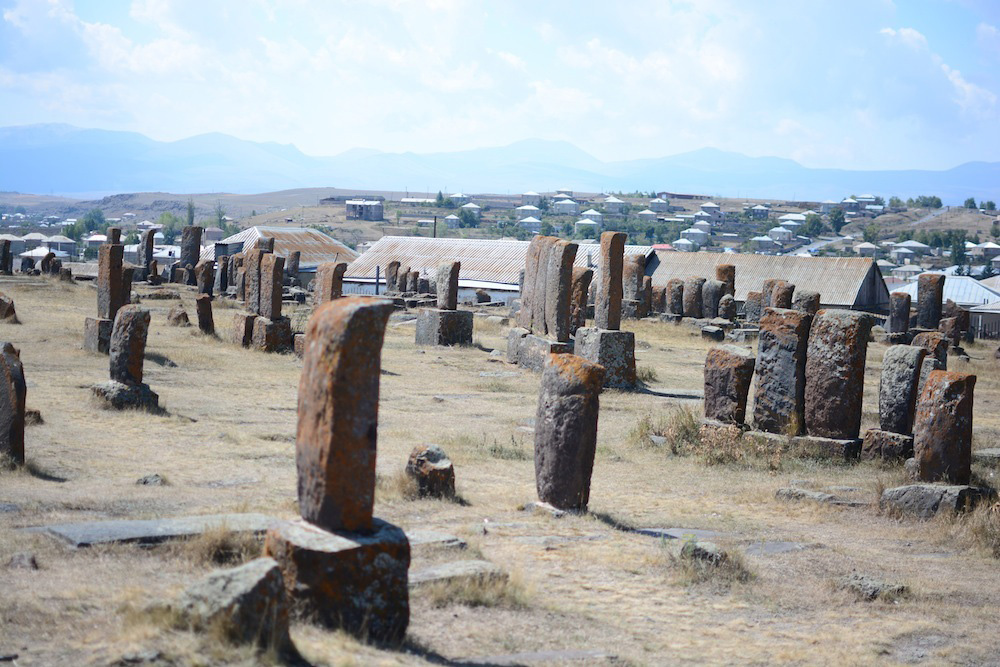
Now, you might be asking yourself, “Why didn’t he learn some Armenian (or, at least, Russian)?” To this I would respond with the following: 1) Fuck y’all, I’m from Texas 2) Have you ever tried to learn Armenian (or, at least, Russian)? and 3) Fuck y’all, I’m from Texas.
“OK,” you proceed, shocked at my vulgarity but still wanting to understand the sort of thought process that might’ve lead me to my own destiny. “So why didn’t you build an extra day or two in your schedule? Surely, with how much you travel, you must’ve known that complications such as this are possible.”
“I’m still from Texas,” I continue, “and I still say ‘fuck y’all.’ But more than that, Armenia is the size of Massachusetts, and the primary aim of my visit there was to visit its most ubiquitous landmark.” If anything, my decision to budget four days for this – which would’ve allotted two for Tatev, plus one for my foolproof day tour and one day in dull-as-dirt Yerevan – was too generous.
Of course, some of it was my fault – it takes two to tango. (Or whatever kind of dance they do in Armenia.)
As I chatted with the young, English-speaking woman I met on the way to Armenia from Georgia, I’d joked that my minimum threshold for a successful trip to Armenia would be having a more positive association of the country than Kim K and/or Cher. And as I think back on my breezy stroll along Lake Sevan, the haunting serenade of a choir singing fourth-century hymns at Geghard, the timeless splendor Garni exuded as the sun set over the gorge behind it and the warm hospitality of everyone at the Tufenkian Heritage Hotel, I feel humbled by the depth of beauty I experienced during my very short time in Armenia.
But as I awaited my departure from the lilliputian, landlocked, resource-poor country, surrounded by enemies, sucking on Russia’s oily tit and still reeling from its having nearly been annihilated a century ago next year, I felt alienated, despondent and jaded, not only by Armenia’s lacking infrastructure for independent travelers, but also, by my own hubris.

Robert Schrader is a travel writer and photographer who’s been roaming the world independently since 2005, writing for publications such as “CNNGo” and “Shanghaiist” along the way. His blog, Leave Your Daily Hell, provides a mix of travel advice, destination guides and personal essays covering the more esoteric aspects of life as a traveler.








